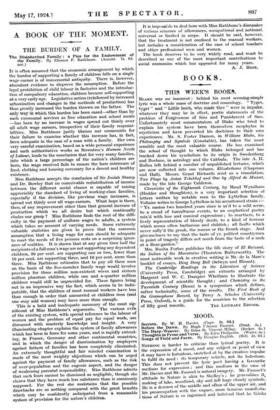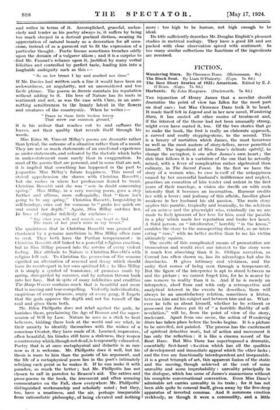MOOD.
Secrets. By W. H. Davies. (Cape. 3s. ed.) NOTHING is harder to criticize than lyrical poetry. It is the expression of a mood, and any subject or point of view
it may have is fortuitous, snatched at by the creative impulse to fulfil its need : its temporary vehicle, not its lodestone. This does not prevent the lyric poet having a favourite medium for expression ; and this medium in the case of Mr. Davies and Mr. Fausset is natural imagery. Mr. Fausset's
attitude to Nature is akin to Shelley's ; he generalizes it, making of lake, woodland, sky and hill huge cloudy symbols. He is a denizen of the middle and often of the upper air, and
his preoccupation with the vaguer, more tenuous manifesta- tions of Nature is so ingrained and habitual that he thinks and writes in terms of it. Accompliihed, graceful, melan- choly and tender as his poetry always is, it suffers by being , too much steeped in a derived poetical dictien,-wearing its appreciation of natural beauty as a decoration for all occa- sions, instead of as a garment cut to fit the expression of a particular thought.. Poetic license sometimes trenches oddly Upon the domain of a vulgarer idiom ; and it is a surprise to &find Mr. Fausset'S reliance upon it, justified by many verbal felicities and controlled by perfect taste, leading him into a laughable ambiguity such as this :—
" So on her breast I lay and marked not time."
If Mr. Davies had written such a line- it would have been an awkwardness, an angularity, not an unconsidered and too facile phrase.. The poems in Secrets maintain his reputation without adding to it. His love of Nature has its roots in ' sentiment and not, as was the case with Clare, in an Imre- . mining sensitiveness to the beauty latent in the flowers and creatures of the countryside. When he writes :— " Peace to these little broken loaves That strew our common ground,"
it is his ardour that reaches out to and suffuses the leaves, not their quality that reveals itself through his words.
Miss Edna St. Vincent Millay's poems are dramatic rather than lyrical, the outcome of a situation rather than of a mood. They arc not so much statements of an emotional experience as under-statements, and coloured by the rhetoric which lurks in under-statement more surely than in exaggeration. In most of the poems that are personal, and in some that are not, it is implied that something has happened in the past to jeopardize Miss Millay's future happiness. This mood of stoical apprehension she shares with Christina Rossetti ; but she rushes in where her predecessor feared to tread. Christina Rossetti said she was " sore in doubt concerning spring." Miss Millay, in a very moving poem, goes a step further and affirms, more colloquially, that " there isn't going to be any spring." Christina Rossetti, languishing in self-bondage, cries out for someone to " probe her quick ore and sound her depth." Again, Miss Millay outdoes her. In lines of singular infelicity she exclaims :-
" Say what you will, and scratch my heart to find The roots of last year's roses in my breast."
The quaintness that in Christina Rossetti was pruned and chdstened by a genuine asceticism in Miss Millay often runs to seed. They both have the Puritan temperament : in Christina Rossetti still linked to a powerful religious emotion, but in Miss Millay pressed into the service of every violent feeling. Her attitude to Nature is Christina Rossetti's with religion left out. To Christina the procession of the seasons signified an alternation of renewal and decay which should have its counterpart in her own spiritual life ; to Miss Millay it is simply a symbol of transience, of promises made by spring, disregarded by summer, and by autumn thrown back into her face. But in spite of many infelicities and crudities The Harp-Wcaver contains much that is beautiful and more that is moving and tear-compelling. Violently individualistic, suspicious of every pleasure, angry at every pang, it forgets that the gods approve the depth and not the tumult of the soul and giVes them both.
Mr. Eden Phillpotts does not rebel against the gods, he banishes them, proclaiming the Age of Reason and the super- session of Will by Law. Nature he uses as a stick to beat believers, bidding- them look at the world and see what, in their anxiety to identify themselves with the wishes of a conscious Creator, they have made of it. Learned, impressive, often beautiful, his tirades still have a staleness, they reopen a controversy which,though not dead; is temporarily exhausted. Poetry that is at once metaphysical and didactic is as rare now as it is welcome. Mr. Phillpotts does it well, but his thesis is more to him than the points of his argument, and the life of a metaphysical poem lies in the poet's intimately relishing each point as he makes it. If he can make it with paradox, so much the better ; but Mr. Phillpotts has not chosen to call in paradox to Reason's aid. The satires and prose-poems in the book, the irreverent and often amusing commentaries on the Fall, show everywhere Mr. Phillpotts' distinguished workmanship and scholarly mind ; but they, too, have a mustiness, and the air, perhaps inseparable from rationalistic philosophy, of being elevated and nothing
more : too high to be human, not high enough to be ideal.
Its title sufficiently describes Mr. Douglas English's pleasant studies in metrical zoology. They have a good lilt and are packed -with close observation. spiced with sentiment. In too many similar collections the functions of the ingredients are reversed.



















































 Previous page
Previous page